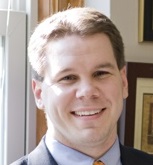By Bob Allen
A Southern Baptist seminary professor says “reparative therapy” is wrong not because it assumes that gay people can change but because it views homosexuality as a psychological problem instead of a sin.
 Heath Lambert, executive director of the Association of Certified Biblical Counselors, said in a Nov. 17 blog that what is missing in secular reparative therapy is “a Christian doctrine of sin.”
Heath Lambert, executive director of the Association of Certified Biblical Counselors, said in a Nov. 17 blog that what is missing in secular reparative therapy is “a Christian doctrine of sin.”
Lambert, who also works as associate professor of biblical counseling at Southern Baptist Theological Seminary and its undergraduate arm, Boyce College, said though controversial, there is much in reparative therapy that Christians can affirm.
Lambert said reparative therapy is correct in holding that homosexuality is harmful and changeable, but despite that “is an unbiblical and ultimately unhelpful approach to change for same-sex attraction.”
“Even though it is profoundly controversial to assert that change is possible, that is precisely what the church of Jesus Christ must say,” Lambert said. “The church cannot only argue that homosexuality is sinful. We must also know how to help people turn away from a life of sexual sin to one of sexual purity.”
“This is where the biblical counseling movement comes in,” he continued. “We must help Christians know how to do ministry in the lives of same-sex attracted men and women. This means we need to illuminate the biblical strategies that lead to change. It also means we must warn against unbiblical counseling strategies.”
Lambert was a speaker at a recent national conference on homosexuality and marriage sponsored by the Ethics and Religious Liberty Commission of the Southern Baptist Convention. Media covering the Oct. 27-29 gathering in Nashville, Tenn., made much of comments by ERLC President Russell Moore describing what is also called ex-gay therapy as “severely counterproductive.”
“The utopian idea if you come to Christ and if you go through our program, you’re going to be immediately set free from attraction or anything you’re struggling with, I don’t think that’s a Christian idea,” Moore told journalists at a breakfast briefing at the Gaylord Opryland Hotel. “Faithfulness to Christ means obedience to Christ. It does not necessarily mean that someone’s attractions are going to change.”
Lambert said one weakness of reparative therapy is that it approaches same-sex attraction with social science rather than biblical truth.
“What is missing in the model of RT is a Christian doctrine of sin,” he said. “Here we arrive at one of the central Christian objections to RT. The secularity of their model is seen as they attempt to explain sinful problems without sin.”
Lambert said another shortcoming of reparative therapy is its goal of helping the client embrace a heterosexual lifestyle.
“This goal is not one that biblical counselors can embrace,” Lambert said. “The Bible never declares that heterosexuality is the goal of a full and contented life.”
“I can say it more strongly,” he continued. “The Bible never says that heterosexuality, in general terms, is a good thing. Sex that the Bible praises is the kind that happens in heterosexual marriage — that is sex in a marriage between one man and one woman. The Bible, however, never commands or commends heterosexual desires in general terms.”
Biblical counseling, Lambert said, seeks a higher goal: “to honor Jesus Christ with sexual purity.”
“A faithful Christian could pursue this goal by turning from homosexuality in either of two ways,” Lambert said. “They could mortify their sinful desires and behavior in a lifestyle of honorable, chaste, Christian celibacy. They could also mortify their sinful desires and behavior in the context of a loving Christian marriage.”
Beyond questions about its effectiveness, Lambert said reparative therapy is based on bad theology.
“If the core problem of homosexuality is something other than sin, the solution will be something other than the grace of Jesus Christ,” he said. “This is an unacceptable concession for Christians. The gospel is truly at stake in this issue.
“Any counseling approach that ignores the importance of repentance and the consequent centrality of Jesus Christ, as RT does, is not worthy to be called Christian,” Lambert said.
For those reasons, Lambert said: “Christians should not claim [reparative] therapy as the Christian approach to ministry with those struggling with same-sex attraction. Far from it. Instead, even as we give thanks to the Lord for the correct observations it makes, we should reject it as an approach to change that misunderstands the problems homosexuals confront, misunderstands the goals they should pursue, and misunderstands the need to lay hold of God’s grace in Christ through repentant faith.”
Lambert said none of that means that ex-gay therapy should be illegal, as some advocate, or that practitioners have no successes to report.
“It means that as Christians we understand more about the problems homosexuals face than any secular reparative therapist ever could,” he concluded. “It also means we shouldn’t trade the profound resources of the gospel of Jesus Christ for ones that are less insightful and less effective.”
Next October the Association of Certified Biblical Counselors is planning its annual conference, to be held on the Southern Seminary campus is Louisville, Ky., around a theme of Homosexuality: Compassion, Care, and Counsel for Struggling People.
Previous story:
